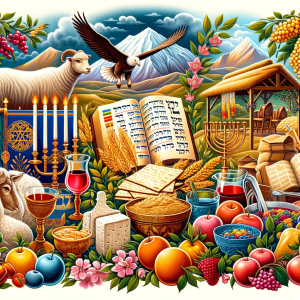Biblical Feasts and Holy Days (1of8)

Overview of Biblical Feasts
Celebrating Our Heritage: The Biblical Feasts
Introduction
Welcome to Lesson 5: “Celebrating Our Heritage: The Biblical Feasts.” In this exploration, we delve into the depths of the major biblical feasts, unveiling their roots, spiritual significance, and traditional celebrations. These feasts are cornerstones of the Hebrew Roots tradition, laden with profound historical and spiritual meaning.
Discussion Points and Possible Answers
1. Major Biblical Feasts and Their Origins
- Passover (Pesach): Commemorates the Exodus from Egypt, celebrating liberation and God’s deliverance.
- Shavuot (Feast of Weeks): Marks the giving of the Torah at Mount Sinai, symbolizing the covenant and adherence to God’s commandments.
- Sukkot (Feast of Tabernacles): Remembers the wilderness journey, representing God’s provision and the joy of harvest.
2. Historical Significance in Israel’s Journey
- Passover: Symbolizes deliverance from Egyptian slavery, highlighted by the lamb’s blood safeguarding the Israelites.
- Shavuot: Celebrates the receiving of the Torah and the establishment of the covenant between God and His people.
- Sukkot: Recollects the Israelites’ dependence on God in the wilderness, emphasizing gratitude for His sustenance.
3. Prophetic Significance of the Feasts
- Passover: Points to Yeshua as the sacrificial lamb, offering salvation from sin.
- Shavuot: Associated with the Holy Spirit’s descent on Pentecost, representing spiritual empowerment and indwelling.
- Sukkot: Foretells the future gathering and rejoicing in God’s presence.
Summary of Discussion
These biblical feasts transcend mere historical commemorations; they embody spiritual symbols, echoing God’s fidelity, His covenant with humanity, and prophetic elements that foresee the Messiah and God’s ultimate promises.
Biblical Story Highlight
A pivotal story in Exodus 12 portrays the Israelites observing Passover in Egypt, signifying emancipation through the sacrificial lamb.
Related References for Study
- Leviticus 23: Offers detailed descriptions of the feasts.
- “The Feasts of the Lord” by Kevin Howard and Marvin Rosenthal: Provides deep insights into these celebrations.
Conclusion
Grasping the essence of these major biblical feasts is vital for a comprehensive understanding of biblical history and theology. They bridge our heritage, reminding us of God’s unwavering faithfulness and pointing to Yeshua’s fulfillment of divine promises. In the Hebrew Roots tradition, we honor these feasts with respect and joy, preserving their essence for future generations.

